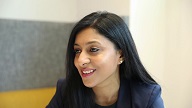South Africa is fortunate to have a youthful population where young people (aged 18–34) are estimated to account for roughly a third of the country’s population.
“With time on their side, young people have the opportunity to start building good money management principles from as early as possible. This in turn can set them up for a prosperous financial future and also help the next generation,” says Aneesa Razack, CEO of Share Investing at FNB Wealth and Investment.

Razack shares these financial tips that young people should consider when securing their financial future:

- Define your goals
The first step is to define your financial, life goals and categorise them according to short, medium, and long-term. Take the time to think about what your financial future looks like in the next few years. This will help you make an informed decision on your saving and investment goals which you can categorise accordingly.
- Have a strategy
Your financial strategy is important because it details your plans to achieve your financial goals. Think about the amount of money you need to put away each month, and the suitable savings and investment vehicles. Becoming financially stable, does not happen overnight. Consistent savings and investments are key in your savings strategy and by committing to put money aside each month will allow your long-term nest egg to grow.
According to Ester Ochse, Product Head at FNB Money Management this step requires you to consider your monthly cash flow, combing through your bank statement to identify unnecessary expenses, and drawing up a budget which includes emergency savings and long-term investments.
“One thing this pandemic has taught us is the importance of accessible emergency savings, which should equate to three months’ salary or income, so that you don’t need to cash your investments early in case of an emergency. A seamless approach is to set up automatic monthly contributions to your savings and investment accounts and these amounts are calculated when drawing up the monthly budget. A quick tip here is to ensure that the contributions to the savings are deducted from your account as soon as you receive your income,” says Ochse.
- Reduce short term debt
As a young person, it is critical to get into the habit of saving for what you want and/or need and only use debt as the last resort, especially expensive forms of debt. If you already have debt, look at ways to minimise your debt to enable you to free-up more funds to put away into savings and investments.
- Find the correct savings and investment vehicles that suit your goals
The ultimate long-term goal is financial independence which includes being able to retire comfortably. As a result, contributing to long term retirement vehicles from as early as possible allows your nest egg to compound, increasing the trajectory of growth. It is never too early to start saving for your retirement. Another long-term investment vehicle to consider is having a Tax-Free Savings Account (TFSA) which gives you the opportunity to invest in ETFs and Unit Trusts. The benefits of having a TFSA is both the capital appreciation and income are tax free, provided that a contribution of R36,000 per year is not exceeded or a maximum investment amount of R500,000 over the lifetime of the investment.
- Allow your money to grow
Do not jump in and out of long-term investments and savings. This will increase the fees paid and not allow your money to work over the long term and achieve long-term investment and savings yields. Reinvest as much of your savings and investments as possible to allow compounding to take effect.
“As a financial services provider, we are committed to ensuring that we play a supportive role to educate and empower the youth to help them secure their financial future. We continue to do this through our assisted and unassisted or digital channels where young people can perform most tasks remotely or contact us when they need help. As a result, we have a range of savings and investment solutions, some of which are tax free or cost effective, along with money management tools like nav>>Money where all customers can get help with budgeting, credit, and savings,” concludes Razack.
INFO SUPPLIED BY FNB.

